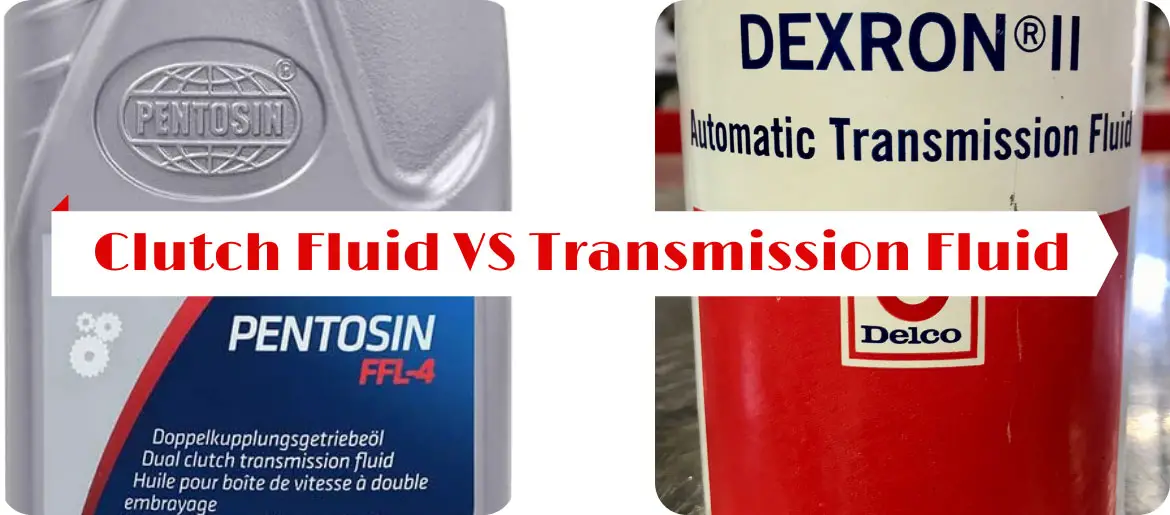Clutch Fluid VS Transmission Fluid | Are They Same?
Mechanical parts inside the car engine face a great deal of friction on a regular basis. To prevent wear and keep our cars running smoothly, different fluids are required. Two of such fluids are clutch fluid and transmission fluid.
Clutch fluid vs transmission fluid? What’s the difference between them? These two fluids share a similarity in the fact that both are lubricating agents. However, that’s where their similarity ends.

As a car owner, you need to know the distinction between these fluids to take proper care of your vehicle. To help you, I’ve discussed the features that make them different from each other.
By the end of this article, you’ll surely be able to draw a clear distinction between clutch and transmission fluid.
What Is Clutch Fluid?
Clutch fluid is an amber-colored fluid that is used to operate the clutch system.
It’s stored inside the master cylinder. When the clutch pedal is pressed, this fluid flows into the slave cylinder. Here, it engages the clutch and shifts the gears.
After the clutch pedal is released, it flows back into the master cylinder.
What Is Transmission Fluid?
Transmission fluid is a red-hued fluid that has different operations based on the transmission system. It is mainly used to lubricate the gearbox.
The metal parts of the gearbox stay submerged in this fluid. As a result, they face less friction and wear.
Clutch Fluid VS Transmission Fluid
The main difference between clutch fluid and transmission fluid is, clutch fluid is used in the vehicle clutch system to operate it smoothly. This is also known as brake fluid. On the other hand, transmission fluid is used in the transmission system to transfer the power from engine to transmission.
1. Composition & Classification
1.1. Clutch Fluid
Clutch fluid can be classified into four categories: DOT 3, DOT 4, DOT 5.1, and DOT 5.
The first three are glycol-ether-based and DOT 5 is silicone-based fluid.
1.2. Transmission Fluid
As there are two types of transmission systems, transmission fluids are also classified into two groups: Automatic Transmission Fluid (ATF) and Manual Transmission Fluid (MTF).
MTF can be general motor oil, synthetic fluid, or ATF. ATF’s are a complex formulation of various additives along with a petroleum or hydrocarbon base fluid.
Depending on your car model, ATF is specified further into MERCON ATF or DEXRON ATF. DEXRON is for General Motors cars and MERCON is for FORD.
2. Viscosity
2.1. Clutch Fluid
Viscosity has a huge impact on clutch system operation. Clutch fluid needs to have more than 1.5 mm²/s viscosity at 100°C temperature to function properly.
2.2. Transmission Fluid
The viscosity of transmission fluid varies from manufacturer to manufacturer. In general, it needs to have 7.77 mm²/s viscosity at 100°C.
3. Durability
3.1. Clutch Fluid
Clutch fluid is moisture absorbent. Hence, it degrades with oxygen exposure and can damage the clutch system if not changed regularly.
3.2. Transmission Fluid
If your gearbox is hermetically sealed, the transmission fluid can last up to 180,000 kilometers. However, if dirt and air enter the transmission fluid via the dipstick tube, it will lose effectiveness gradually.
To increase the durability of both, prevent air and moisture exposure.
4. Maintenance
4.1. Clutch Fluid
Time and increasing moisture levels turn clutch fluid corrosive. Also, high moisture causes vapor lock which can cause the failure of your entire clutch system.
So, you need to perform routine checks every two years or after 40,000 kilometers.
4.2. Transmission Fluid
In the case of MTF, the metal parts of the gearbox wear out and contaminate the fluid. As a result, it loses lubricating power, and the overall performance decreases.
To avoid this, check your MTF every 30,000 to 60,000 miles. If the fluid is contaminated, drain it and refill with new fluid.
ATF on the other hand have a longer lifespan than clutch fluid and MTF. Some manufacturers claim ATF can last the lifetime of a car.
However, excessive heat and metal wear can cause contamination in ATF too. So, it’s wise to check the fluid level every 30,000 to 100,000 miles.
FAQ
Is Transmission Fluid The Same As Brake Fluid?
No, Brake fluid vs transmission fluid is a big confusion among new car owners. The simple answer is no. Transmission fluid is not the same as brake fluid. Transmission fluids keep the gearbox lubricated. And brake fluids power your brakes.
Can Transmission Fluid Be Used In Place Of Clutch Fluid?
No, Transmission is petroleum-based and more viscous than clutch fluid. So, it can’t be used as the clutch fluid.
Is Clutch Fluid The Same As Brake Fluid?
Yes, they are the same. When the brake fluid is placed inside the master cylinder, it’s called clutch fluid.
What Will Happen If I Use the Wrong Transmission Fluid?
Using the wrong transmission fluid will result in poor lubrication. This will overheat the components and damage the entire transmission system.
Wrapping It Up
Clutch and transmission fluids vary in many different aspects. While the former facilitates clutch execution, the latter keeps the gearbox lubricated. Both clutch and transmission fluid are crucial for keeping our cars in good shape.
Hopefully, our discussion has cleared any doubts you had regarding clutch fluid vs transmission fluid. Lastly, perform maintenance at required intervals to ensure optimum performance of your vehicle.






